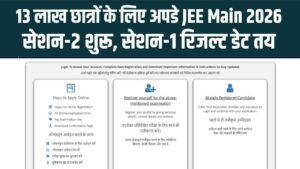As India’s technology sector drives a new wave of global digital transformation, the career debate between Full Stack development, DevOps engineering, and Data Science is fundamentally about empowering individuals to find their most fulfilling and impactful professional roles.
Each high-growth path offers the opportunity to contribute unique skills Whether it is building accessible user interfaces (Full Stack), ensuring reliable service delivery (DevOps), or extracting critical insights to solve societal problems (Data Science).

Therefore, the choice is an important personal investment that helps job seekers navigate 2026’s competitive landscape, allowing them to align their talents with a long-term commitment to innovation and secure a dignified livelihood by shaping the technological infrastructure of the future.
The choice between Full Stack, DevOps, and Data Science in 2026 will depend on individual interests, existing skills, and adaptability. While all three paths promise growth, hybrid expertise will likely become the most valuable asset in a future where software engineering, infrastructure, and data are deeply interconnected.
Table of Contents
Understanding the Roles
Full Stack Development
Full Stack developers manage both frontend and backend systems, enabling them to build complete web or mobile applications. They typically use frameworks like React or Angular for interfaces and Node.js, Python, or Java for server logic.
DevOps Engineering
DevOps engineers integrate development and operations, focusing on deployment automation, cloud scalability, and system reliability. They rely heavily on containerization tools such as Docker and Kubernetes, alongside cloud services from AWS, Azure, or Google Cloud.
Data Science
Data Scientists focus on extracting insights from data through machine learning, statistical analysis, and predictive modelling. Their expertise is increasingly critical in sectors ranging from healthcare to e-commerce, where data-driven decisions shape strategy.
Career Path Comparisons
Demand Outlook
- Full Stack roles are projected to remain among the top five most in-demand technology positions globally, according to LinkedIn’s 2024 workforce report.
- DevOps demand is rising as enterprises accelerate adoption of cloud-native systems and microservices. Gartner forecasts that 75 per cent of enterprises will have adopted full DevOps practices by 2026.
- Data Science is expanding rapidly, with the World Economic Forum predicting 11.5 million global vacancies in analytics and AI-related roles by 2026.
Salary Trends in India
- Full Stack Developers typically earn between ₹7–15 lakh annually, with higher figures in product-based companies.
- DevOps Engineers see ranges from ₹9–20 lakh depending on experience and cloud certifications.
- Data Scientists can command ₹10–25 lakh or more, especially in machine learning and AI-focused firms.
Skills and Learning Paths
Full Stack Development
- Core Skills: HTML, CSS, JavaScript, backend frameworks, SQL and NoSQL databases, REST/GraphQL APIs.
- Best For: Individuals who enjoy seeing applications through from conception to deployment and value versatility.
DevOps Engineering
- Core Skills: Linux administration, scripting, CI/CD pipelines, infrastructure as code (Terraform, Ansible), monitoring tools.
- Best For: Those with strong problem-solving ability who prefer infrastructure, automation, and systems thinking over user-facing design.
Data Science
- Core Skills: Python or R, machine learning libraries (scikit-learn, TensorFlow, PyTorch), SQL, data wrangling, statistics.
- Best For: Candidates with a passion for numbers, mathematics, and generating business insights from data.
Pros, Challenges, and Suitability
Full Stack
- Pros: Versatility, strong demand in startups, visible impact.
- Challenges: Requires constant upskilling in both frontend and backend technologies.
DevOps
- Pros: High relevance in cloud-native enterprises, critical for scaling.
- Challenges: Stressful environments, frequent on-call responsibilities.
Data Science
- Pros: Strong salary potential, central role in AI-driven strategies.
- Challenges: High barrier to entry, requires statistical and mathematical expertise.
Expert Viewpoints
Dr. Kavita Menon, Professor of Computer Science at Delhi University, told this reporter: “The decision should depend less on salary expectations and more on long-term interest. Each role has a learning curve, but only sustained engagement will ensure success.”
Ankush Patel, senior recruiter at a Bengaluru IT services firm, added: “Employers increasingly seek hybrid skill sets. A data scientist who understands deployment, or a developer comfortable with DevOps tools, has a clear advantage.”

















